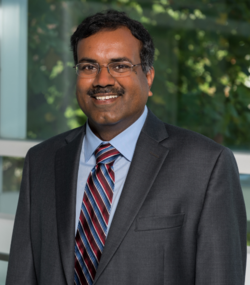Srinivas Aluru | |
|---|---|
 | |
| Citizenship | American |
| Alma mater | Iowa State University |
| Awards | John V. Atanasoff Discovery Award (2017) IEEE Fellow (2010) AAAS Fellow (2010) Swarnajayanti Fellowship (2007-2012) IEEE Computer Society Golden Core IEEE Computer Society Meritorious Service NSF Career (1997) ACM Fellow (2020) SIAM Fellow (2020) IEEE Computer Society Charles Babbage Award (2025) |
| Scientific career | |
| Fields | High performance computing, data science, bioinformatics, scientific computing, string algorithms |
| Institutions | Iowa State University Georgia Institute of Technology |
| Thesis | Distribution-independent hierarchical N-body methods |
| Doctoral advisor | John Gustafson, G.M. Prabhu |
Srinivas Aluru is a professor in the School of Computational Science and Engineering at Georgia Institute of Technology, and co-Executive Director for the Georgia Tech Interdisciplinary Research Institute in Data Engineering and Science. [1] [2] His main areas of research are high performance computing, data science, bioinformatics and systems biology, combinatorial methods in scientific computing, and string algorithms. Aluru is a Fellow of the American Association for the Advancement of Science (AAAS) and the Institute for Electrical and Electronic Engineers (IEEE). He is best known for his research contributions in parallel algorithms and applications, interdisciplinary research in bioinformatics and computational biology, and particularly the intersection of these two fields. [3] [4]